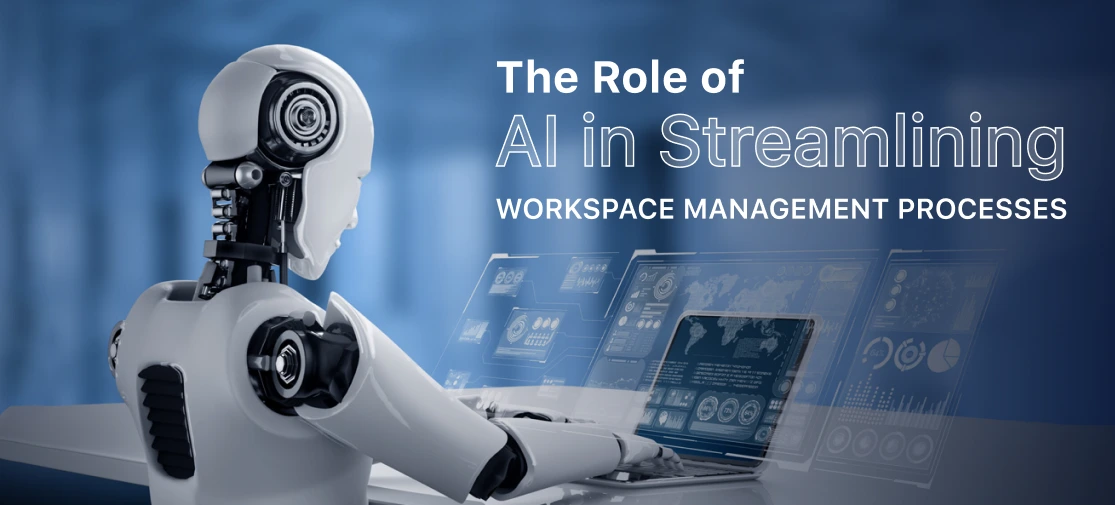Introduction
The necessity for smart and efficient workspace management has never been more important as businesses continue to change. The modern workplace is a dynamic setting that must change to accommodate new working methods; it is no longer merely a physical location where employees come and go. Traditional workspace management techniques are failing in the face of remote work, flexible scheduling, and the growing need for collaboration. To improve the entire working experience and expedite these procedures, Artificial Intelligence (AI) offers ground-breaking solutions.
The Intersection of AI and Workspace Management
AI technologies are transforming workspace management by offering innovative solutions to enhance operations. Allocating space, scheduling resources, maintaining facilities, and improving the employee experience are just a few of the many tasks that go under the umbrella of workspace management. Conventional approaches frequently entail time-consuming and labor-intensive procedures, which can result in inefficiencies and higher expenses.
The ability of artificial intelligence to handle enormous volumes of data, produce insights, automate tedious operations, and forecast future trends is the foundation of the relationship between AI and workspace management. Businesses can use AI to optimize their workplaces, increasing productivity, cost-effectiveness, and staff responsiveness.
AI-driven tools can analyze complex datasets to understand how workspace resources are utilized. This analysis can help managers make data-driven decisions about space allocation, ensuring that every square foot is used effectively. Moreover, AI can assist in designing workspaces that foster creativity and collaboration by identifying patterns in employee interactions and preferences.
How Does AI Improve Efficiency in Workspace Management ?
Space Utilization Optimization
By analyzing occupancy data and offering insights into how spaces are being used, artificial intelligence (AI) technology can greatly improve space utilization. IoT devices and sensors can gather information on office usage patterns, including when and where workers work, the frequency of meeting room occupancy, and the identification of underutilized areas. After processing this data, AI algorithms recommend the best setups and layouts. By ensuring that spaces are used effectively, this data-driven method lowers wasted real estate and raises tenant happiness.
Predictive Maintenance
Facility maintenance is a crucial part of workspace management, and AI can transform it from a reactive to a proactive function. Through machine learning and predictive analytics, AI systems can anticipate when equipment or infrastructure will likely fail or require servicing. This allows for timely maintenance, minimizing disruptions, and extending the lifespan of assets. Predictive maintenance reduces downtime, saves costs, and creates a safer, more reliable working environment.
Resource Scheduling and Management
It can be difficult to manage shared resources like desk spaces, equipment, and conference rooms, particularly in larger firms. By automating reservations and optimizing schedules based on usage patterns and historical data, AI can expedite this process. By ensuring that workers have the resources they require at the appropriate time, intelligent resource management improves teamwork and production. Additionally, it reduces disputes and duplicate reservations, resulting in a smooth operation.
Enhanced Employee Experience
AI can play a vital role in enhancing the employee experience by personalizing the workspace to fit individual needs and preferences. Personalized AI systems can adjust lighting, temperature, and other environmental settings based on employee profiles. Additionally, AI-driven chatbots and virtual assistants can guide employees through workspace services, whether it's finding available desk spaces, booking meeting rooms, or submitting IT requests. Such personalization increases comfort and satisfaction, translating into higher productivity and morale.
Data-Driven Decision Making
AI equips workspace managers with powerful data analytics tools that enable informed decision-making. By analyzing various metrics such as employee satisfaction, space utilization, and operational efficiency, AI provides actionable insights that guide strategic planning. Organizations can identify trends, forecast future needs, and align workspace strategies with organizational goals. This data-driven approach reduces guesswork and supports evidence-based management, leading to more effective outcomes.
Conclusion
AI is transforming the landscape of workspace management, offering solutions that enhance efficiency, reduce costs, and improve the overall workplace experience. Its ability to analyze large datasets, predict trends, and automate repetitive tasks makes it an invaluable tool for modern organizations. By optimizing space utilization, enhancing maintenance processes, streamlining resource management, and personalizing employee experiences, AI creates work environments that are more adaptive and responsive to today’s dynamic business needs.




